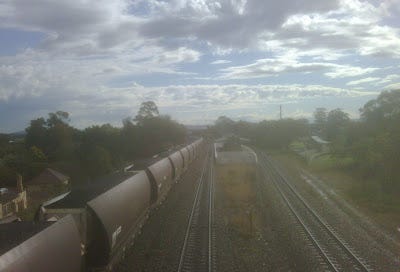*
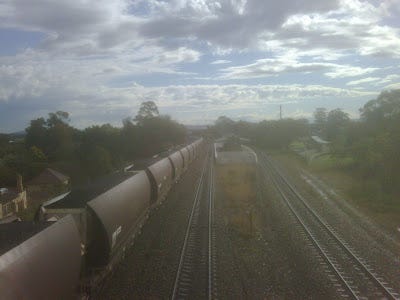
A lesson, a gesture, a story, a philosophy, an attitude—I took something from every man in Steve's bar. I was a master at “identity theft” when that crime was more benign. I became sarcastic like Cager, melodramatic like Uncle Charlie, a roughneck like Joey D. I strived to be solid like Bob the Cop, cool like Colt, and to rationalize my rage by telling myself that it was no worse than the righteous wrath of Smelly. Eventually I applied the mimicry I'd learned at Dickens to those I met outside the bar—friends, lovers, parents, bosses, even strangers. The bar fostered in me the habit of turning each person who crossed my path into a mentor, or a character, and I credit the bar, and blame it, for my becoming a reflection, or a refraction, of them all.
Every regular at Steve's bar was fond of metaphors. One old bourbon drinker told me that a man's life is all a matter of mountains and caves—mountains we must climb, caves where we hide when we can't face our mountains. For me the bar was both. My most luxuriant cave, my most perilous mountain. And its men, though cavemen at heart, were my Sherpas. I loved them, deeply, and I think they knew. Though they had experienced everything—war and love, fame and disgrace, wealth and ruin—I don't think they ever had a boy look at them with such shining, worshipful eyes. My devotion was something new to them, and I think it made them love me, in their way, which was why they kidnapped me when I was eleven. But now I can almost hear their voices. Whoa, kid, you're getting ahead of yourself.
J.R. Moehringer, The Tender Bar.
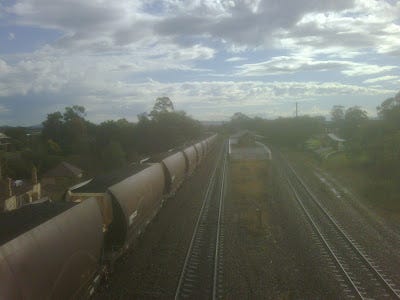
What shocked him was the degree of his own romanticisation of these people, many of them dead. "I've never known anyone who knows so many dead people as you," someone had said, and while it wasn't Rawanda, the lifestyle we had fallen into was dangerous indeed. Bruce, the tall gangly poet, was the first to go, and he could not drive past that street in Turramurra where Bruce's parent's lived without thinking of the cold sadness of that early loss. He had spent his childhood nights floating across the cold suburbs, billowing on the wind, peering down, lost and alone yet triumphant in his liberation. Then he had found a new band, the partying gang, and while Bruce's death should have served as a warning of more to come, nothing was going to stop them. The grand chaos of the era could be heard even in this remote place, the giant concerts of the Rolling Stones at Wembley Stadium somehow had their echoes here on the other side of the world; and later Lou Reed in New York would play out in our loungerooms, as we sat around in and endless daze, playing cards, dealing out the 500 pack time and time again.
He had been in love with Tim and Jan and the whole damn gang, their children, the motley crew, Ian Farr, John Bygate, Lyn Hapgood, Colin Griffith. Every last one of them was dead now. The wonderfully eccentric sight of off-her-trolley Lyn wheeling her pram about Paddington, stumbling out of Bygate's beautiful Paddington terrace to see the day. John Bygate was everything he had wanted to be: astonishingly handsome, fabulously out of it, a great record collection, an intellectual obscurity which shut out all the hoi palloi. They were different, their closed club, intellectual giants, creative originals. John was always scribbling obscure music notations on sheets of paper, and he took to doing the same, writing obscure, funereal melodies while struggling to understand first year philospohy. He wanted to be different. He wanted to be loyal to his band. He thought of them as the beginning and the end, the group who's partying ways would change the entire country with the brilliance of their artistic output.
He wrote and he wrote, sine qua sine, garbled Latin phrases, ancient, ethereal floating castles, the ground littered with the crunched glass of shattered syringes, black and white chequered floors, a spiritual, hallucinatory place open only to the terminally gifted. In 2009, a quarter of a century after Bygate had lived in the apartment in Moore Park Road they drove past, Karl looked out of the car window and picked out the terrace where he had lived with Ian Farr and John Bygate and the rest of them. For the first time he heard the story of how Karl had met Bygate. He had been looking for a card reader, a clairvoyant, in Paddington, and had knocked on the wrong door. Bygate had answered, the ever present glass of white wine in his hand. Come in, come in, he declared expansively, as if he had been expecting him. Karl tried to explain that he had knocked on the wrong door and was looking for someone else, but Bygate was having none of it. Soon enough they were sitting around the kitchen table smoking. Soon enough John was talking about getting some pills, he just needed a bit more money to pay for the script. Soon enough they were collecting a bottle of mandrax and were off their scones.
And that was how Karl came to know that crazy crazy gang. It was the early 80s and they were already on the slippery slope. By that time he had started work at the Sydney Morning Herald, and his life was changing as he entered the mainstream. Sometimes he would sit around the Moore Park flat, hanging out with the old gang, listening to the hysterical tales of the male prostitute who would wander in from upstairs, complaining about his work load. Or knock back the proposition that he would fill in for him on one of the jobs. These were different days. He was too old to sell the flesh; ashamed of his own past, keen to become a new, professional person. But he still liked the bohemian tales, as if these people were more genuine than most he met. And so he would sit there, listening to the tales of chaos and lack of money, of unfulfilled dreams. Bygate was already getting more and more obscure. Already it was such a contrast from the fabulous person he had known in his hey day, in the late 60s, when they first met at that wonderful sugar-daddy provided house in Elizabeth Street, Paddington.
His moisturised skin was already beginning to show the wear and tear of the alcoholic. The fabulous terrace was long gone; as was the sugar daddy. His boyfriend, that shocking junky Gary, later to father a child with Virginia Fay, was also gone; and somehow it was this last in a long line of losses which seemed to toss Bygate closer and closer to the cliff's edge. He reigned over the motley bohemian crew that infected Moore Park, like some ancient, eccentric aunt. He wished them all well. He mumbled incoherently. He still drank his white wine, but these days it came from a cask. He still scribbled notations on sheets of music, but these days no one really believed he was about to produce a new Australian masterpiece. Another bottle of mandrax would arrive, and yet again the gang would be stumbling about, losing it, wandering off to the pub and returning days later, slurring words, falling into each other, desperately out of it, desperately in love. Instead of this life, these days he got up and went to work each morning. His visits became less and less regular.
And finally he wandered off altogether. And Bygate took another step down the slippery slope, moving to Adelaide where it was cheaper to live on the dole. And finally dying of a brain haemorrage. He never got sober. He never turned back. Karl and he held the memory, but even that was becoming increasingly obscure as they themselves aged and all that remained of that strange time was the memories of two men in their 40s and 50s as they drove down a busy Sydney street.
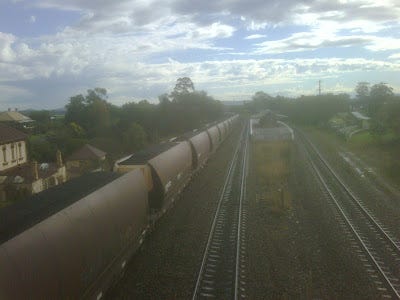
THE BIGGER STORY:
http://news.bbc.co.uk/2/hi/business/8169869.stm
Top leaders of the US and China are meeting in Washington to discuss key economic and political differences.
President Obama said the relationship between the US and China would shape the 21st century and said the two shared a "mutual interest".
China has sent Vice Premier Wang Qishan and State Councillor Dai Bingguo.
The meeting, called the US-China Strategic and Economic Dialogue, is the first formal negotiation between the US and China since Mr Obama took office.
'Strong coordination'
The talks will cover a range of issues, including halting the spread of nuclear weapons in North Korea and Iran, and creating clean and secure energy sources.
But the main focus will be on working towards economic recovery.
"The current crisis has made it clear that the choices made within our borders reverberate across the global economy - and this is true not just of New York and Seattle, but Shanghai and Shenzhen as well," President Obama said at the start of the meeting.
"That is why we must remain committed to strong bilateral and multilateral coordination."
Vice Premier Wang also said it was a "critical moment" for the world economy as it moves out of crisis and towards recovery.
Treasury Secretary Timothy Geithner and Secretary of State Hillary Clinton co-host the talks.
http://www.theaustralian.news.com.au/story/0,25197,25843607-5017771,00.html
Michael Stutchbury
THE PM bags the deregulation of the past 25 years but claims he wants to boost productivity.
KEVIN Rudd's second long crisis essay continues to misdiagnose Australia's economic challenges as stemming from the failures of a "decade of neo-liberal free market fundamentalism". And, compared to the first essay penned in January, an emboldened Prime Minister now feels vindicated that massive government intervention has saved global capitalism. But these intellectual foundations muddy rather than clarify the PM's reform principles for driving the next decade of productivity growth. His road to recovery ends up in the hoary political refuge of "nation building", which will also serves to justify post-crisis belt-tightening.
Rudd's straw man case against neo-liberalism is based on the historical fact that financial markets are vulnerable to herd-like swings between irrational exuberance and panic which, in this case, destabilised the global macro-economy.
Yet the intellectual critique of "behavioural economics" is better at poking holes in the "efficient markets hypothesis" that individuals act rationally than in demonstrating that governments know or can do better. In any case, this debate is largely confined to financial markets, not the whole sweep of pro-market economics. And it is largely a northern hemisphere argument, notwithstanding Rudd's efforts to lash the Howard-Turnbull Liberals to the supposed sins of "the right". A feature of the crisis is how well Australia's banking supervision has held up. The Reserve Bank has never been fundamentalist on financial markets, for instance supporting a floating dollar but also acknowledging that financial asset markets can "overshoot".
In a speech to the Sydney Institute last month, the federal Treasury's group director David Gruen outlined how mainstream macroeconomic theory had gone off course over the past few decades by incorporating the microeconomic assumption that financial markets were naturally self-correcting because well-informed individuals acted rationally in response to proper incentives. But Gruen pointedly added the following footnote: "In case I am being interpreted as pouring scorn on the benefits of more deregulated markets generally as opposed to financial markets in particular, let me dissuade you from that view.
http://www.theaustralian.news.com.au/story/0,25197,25843727-20261,00.html
Rudd addresses the Labor Party in Hobart on Saturday on the reception his essays received in these pages
TODAY, you might have read an essay that I published in the national press that looks beyond the immediate response to the global recession towards the challenges of economic recovery.
I've noticed that some don't particularly appreciate it when I write long essays.
http://www.theaustralian.news.com.au/story/0,25197,25843727-20261,00.html
After the publication of my last essay in The Monthly six months ago, I'm informed that one national newspaper published more than 50 separate articles attacking it in one way or another.
I'm also informed that's about 60,000 words the newspaper in question devoted to my mediocre prose.
Nearly 10 times the length of my original essay.
We should welcome a real debate about different ideas for the nation's future, including from newspapers that declare themselves unashamed defenders of the ideological Right.
Ross Gittins in The Age and The Sydney Morning Herald yesterday goes to war with occasional Fairfax contributor Kevin Rudd:
I'VE forced myself to read every bit of Kevin Rudd's latest 6100-word diatribe on economic recovery. Now I know what it must be like to sit through one of Fidel Castro's three-hour speeches.
It was a combination of the sensible and the self-serving, marred by its partisanship. Rudd nowhere acknowledges the role of his Liberal predecessors in pursuing the policies that left us so well placed in the global crisis.
He fails to admit that the relatively low and unconcerning levels of public debt in prospect are the product of his predecessors' budget surpluses and zero net debt.
The Libs also deserve credit for the good shape our banks are in. It was they who reformed our prudential supervision system, putting it in the hands of a single, well-armed regulator, and they who persisted with the Four Pillars policy that did so much to keep our banks out of trouble.
The notion that the Libs could be fairly described as "neo-liberal free-market fundamentalists" is laughable.
I'm starting to see the motive for all this "tough times" talk: you make it sound terrible so that, when it turns out it isn't so bad, voters are more relieved than angry.
It's spin, in other words.
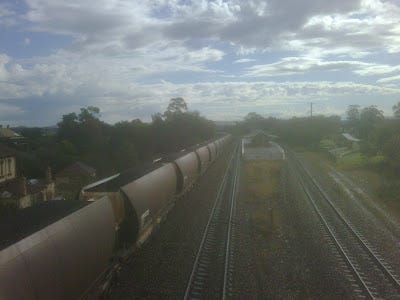
Redfern railway lines, Sydney, Australia.

